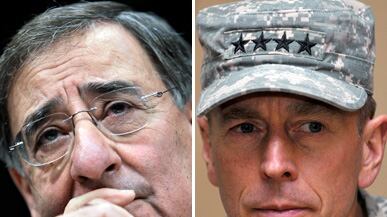Poor Leon Panetta. His predicted nomination as secretary of Defense will set the capstone on an astonishing career. But he’ll find it a thankless job. Insiders have long thought Panetta to be the likeliest successor to Robert Gates. He has all the qualifications. Sixteen years as a congressman from California made him wise in the ways of the Hill. As sometime chair of the House Budget Committee and, later, director of the Office of Management and Budget, he can be a heavyweight player in the coming battles over spending. His two-and-a-half years as President Clinton’s chief of staff after Republicans took the House in 1994 will have given him unique insights into the tensions of a White House under political pressure. Finally, the fact that he is already part of President Obama’s national security team means that he should be a shoo-in for confirmation—and that he won’t be an unsettling new face around the table in the White House Situation Room.
He’ll still find the job a wearying one. The Pentagon budget faces deep cuts—anywhere from $400 billion to, according to one prescription, $1 trillion—over the next decade. Cuts anywhere close to the high-end estimate would force a wrenching reappraisal of America’s military and its missions. U.S. commitments in Afghanistan and Iraq will be downsized but are not going to go away. Libya looks to be a problem in no danger of quick solution. And who knows what lies ahead in the Middle East. And then… And then…America’s global military commitments are today’s empire on which the sun never sets.
As a sheer unremitting grind, the secretary of Defense’s job is second only to that of the president. Gates once recalled that, after he took office in the last days of 2006, he was working 15-hour days trying to salvage the war in Afghanistan; even now it’s a 10-hour day, plus evenings of letter-writing to the families of those killed in action.
The grind raises the only substantive question about the choice of Panetta. He will be 73 in June. Donald Rumsfeld was the oldest Defense secretary in history when he came into the Pentagon in January, 2001; he was 68. Well before he stepped down, Rumsfeld was exhausted—and just one year older than Panetta will be coming into the job. At the CIA, aides say, Panetta has been careful to pace himself—adhering, when he can, to the congressional practice of three-day weekends. The workload at the Pentagon is unlikely to permit that. A betting man would reckon that Panetta will likely stay at the Pentagon only until January 2013, whoever is then sworn-in as president.
Panetta’s reported successor as director of CIA, General David Petraeus, is an inspired choice. There has long been speculation that Petraeus might take over the top military job, chairman of the Joint Chiefs of Staff. (The current chairman, Admiral Mike Mullen, retires in the fall.) President Obama owes Petraeus for instantly agreeing to step down a rung, from boss of Central Command back once more to commander in Afghanistan, after unseemly remarks by aides snuffed out Gen. Stanley McChrystal’s career.
A betting man would reckon that Panetta will likely stay at the Pentagon only until January 2013, whoever is then sworn-in as president.

But Petraeus as Joint Chiefs chair would have been an uneasy fit. Gates has repeatedly lauded Petraeus as “the pre-eminent soldier-scholar of his generation.” And his star-power—on the Hill, in the media, even in discussions in the White House—means he’d threaten to overshadow any secretary of Defense.
To the CIA, however, Petraeus will bring an unmatched consumer’s view of what the agency is doing well, and where it’s falling down. Panetta’s two-and-a-half years at Langley are reckoned a big success: he’s steered the agency past the water-boarding scandals of the Bush years; restored morale; re-established the necessary comfort level on the Hill. But, within the Washington Beltway, gossip has been growing that the agency could now benefit from a fresh pair of eyes.
The Predator campaign over Pakistan and Afghanistan means that the CIA is effectively running a separate Air Force, outside the codes and constraints of the U.S. military. On the ground, the CIA’s paramilitary forces have metastasized: in the wake of the mysterious shooting incident involving CIA contractor Raymond Davis in Lahore in January, Pakistan is angrily questioning the presence on its soil of some 330 Americans whom the Pakistanis identify as CIA-associated, with the status of a further 140 Americans in limbo as Pakistan weighs whether to renew their visas. In modern times, the CIA has rarely had a military boss—though Air Force Gen. Michael Hayden did move over from the National Security Agency to become Panetta’s predecessor. But a military man of Petraeus’ up-to-the-minute experience is, arguably, what the CIA needs to oversee, and if necessary reshape, its military activities. On taking up the CIA job, Petraeus will resign from the military—a move which may only stoke the already fiery furnace of rumors about the general’s political future. As a civilian, though not as a serving officer, he would in time be free to take any other Cabinet post. Colin Powell—general, chairman of the joint chiefs, national security adviser, secretary of State—blazed a career path Petraeus may yet follow.
The Panetta/Petraeus moves are only the first in a chain of decisions President Obama has to make about his national security team. Most immediately, he has to select a new chairman and vice-chairman of the joint chiefs, as well as a chief of naval operations. Names of reputed favorites for each—Odierno, Stavridis, Schwartz, Cartwright—are bandied about in Washington’s version of Guys and Dolls. The uncertainty surrounding who’s likely to become WHAT is now compounded by the fact that Panetta will presumably seek to have input into the choice of candidates. He will have to work with them, after all.
John Barry joined Newsweek's Washington bureau as national security correspondent in July 1985. He has reported extensively on American intervention in Afghanistan, Kosovo, Haiti, Bosnia, Iraq and Somalia and efforts for peace in the Middle East. In 2002, he co-wrote The War Crimes of Afghanistan (8/26/02 cover) which won a National Headliner Award. He won the 1993 Investigative Reporters & Editors Gold Medal for his investigation of the shooting down of an Iranian airliner by the USS Vincennes, as well as a 1983 British Press Award—the British equivalent of a Pulitzer—for his reconstruction of the U.S.-Soviet negotiations to ban intermediate range nuclear missiles in Europe.






